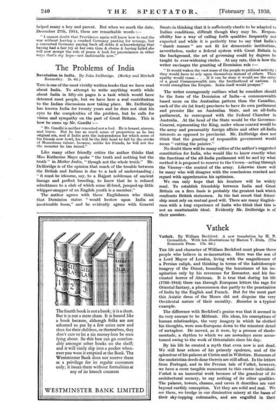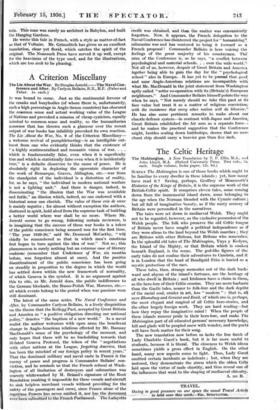Vathek
THE life and character of William Beckford must please those people who believe in re-incarnation. Here was the son c,f a Lord Mayor of London, living with the magnificence of a Persian caliph, and thinking in terms of the kaleidoscopic imagery of the Orient, bounding the luxuriance of his im- agination only by his reverence for Zoroaster, and his fas- cinated horror of Ahriman. It is true that during his life (1760-1844) there ran through European letters the rage for Oriental fantasy, a phenomenon due partly to the penetration of India by the English and French. But for the most part this Asiatic dress of the Muses did not disguise the very Occidental nature of their morality. Rasselas is a typical example.
The difference with Beckford's genius was that it seemed in its very essence to be Mithraic. His ideas, his conceptions of human relationships, the very imagery in which he clothed his thoughts, were non-European down to the minutest detail of metaphor. He moved, as it were, by a process of rhodo- montade, a rhythm to which we are nowadays more accus- tomed owing to the work of Orientalists since his day.
By his life he created a myth that even now is not dead. We still hear echoes of his princely opulence, and of the splendour of his palaces at Cintra and in Wiltshire. Rumours of the unchristian deeds done therein are still afloat. In the letters from Portugal, and in the Persian tale of Vathek, however, we have a more tangible monument to this exotic individual. Vathek is an immortal work because of the grandeur of its architectural scenery, to say nothing of its other qualities. The palaces, towers, chasms, and caves it describes are vast beyond earthly conception, Yet they are solid and real. We See them, we trudge in our diminutive misery at the bases of their sky-topping colonnades, and are engulfed in their ruin. This man was surely an architect in Babylon, and built the Hanging Gardens.
He *rote' this tale in French, with a style as matter-of-fact as that of Voltaire. Mr. Grimsditch has given us an excellent translation, clear yet florid, which catches the spirit of the original. The Nonesuch Press have served it up well, except for the heaviness of the type used, and for the illustrations., ,
which are too arc/i to-be pleasing. ' - -











































 Previous page
Previous page